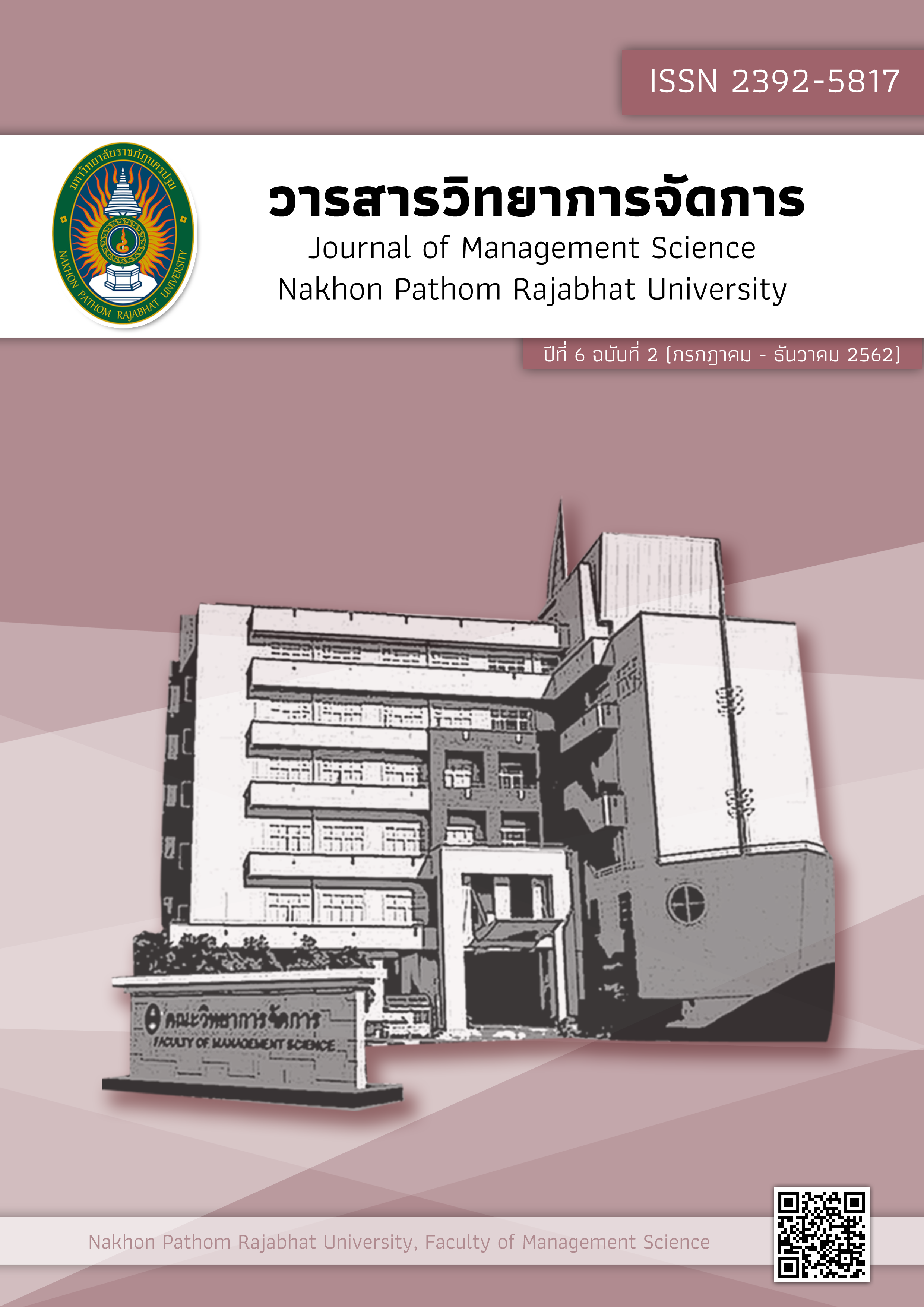Factors affecting learning organization development of supporting staff in Thonburi 1 Hospital
Main Article Content
Abstract
The purposes of this research were to: 1) study the factors affecting being learning organization of supporting staff in Thonburi 1 Hospital; 2) identify supporting staff’s opinion on being learning organization of Thonburi 1 Hospital; 3) compare supporting staff’s opinion on being learning organization of Thonburi 1 Hospital as classified by personal factors; and 4) analyze development guidelines for learning organization to improve work quality of supporting staff in Thonburi 1 Hospital. The research sample was divided into 2 groups: 1) questionnaire respondents consisted of 400 supporting staff in Thonburi 1 Hospital, derived by convenience sampling; and 2) interview respondents consisted of head of directing division, head of service system development and health service support, and supporting staff in Thonburi 1 Hospital, totaling 6 persons, derived by purposive sampling. The research instruments were a questionnaires with the IOC content validity between 0.67-1.00, and an interview form constructed by the researcher. Data were analyzed with percentage, mean, standard deviation, t-test, one-way ANOVA, multiple regression and content analysis.
The research results were as follows:
1. Overall, the factors affecting being learning organization of supporting staff in Thonburi 1 Hospital was at a high level. When considering each aspect, all aspects were at a high level. Specifically, the aspects of vision, mission and strategy; organizational structure; organizational culture; leadership; and motivation had the same average; while work atmosphere has the least average.
2. The supporting staff’s opinion on being learning organization of Thonburi 1 Hospital was at a high level. When considering each aspect, all aspects were at a high level. These aspects, in the descending order, were excellence of staff, systematic thinking, thinking pattern, shared vision, and team learning.
3. The supporting staff in Thonburi 1 Hospital with difference in personal factors had different level of opinion on being learning organization of Thonburi 1 Hospital. Overall, the supporting staff with difference in gender, age, position, and education level had different level of opinion toward being learning organization of Thonburi 1 Hospital with significance level at .05. However, there was no difference among those with difference in work experience.
4. The organizational culture, work atmosphere, organizational structure, leadership, and motivation together predicted being learning organization of supporting staff in Thonburi 1 Hospital at the percentage of 69.90 with statistical significance level at .05. The regression equation was Ŷtot = 2.391** + 0.045 (X1) + 0.247** (X2) + 1.247** (X3) + 3.623** (X4) + 0.939** (X5) + 3.192** (X6).
5. The development guidelines of learning organization to improve work quality of supporting staff in Thonburi 1 Hospital should be focused on organizational culture which is the factors with the highest effect, followed by work atmosphere and leadership. Staff should be instilled learning awareness by creating organizational culture of sharing and exchanging opinion, and experience. Work atmosphere should consistently encourage and facilitate learning and knowledge sharing of the staff. Additionally, organization leaders should promote learning organization building. These are important factors to develop learning organization to improve work quality of supporting staff in Thonburi 1 Hospital. They are building awareness of staff to be enthusiastic in learning and develop staff’s potential for personal and organizational progression.
Article history : Received 2 Februarys 2018
Revised 1 April 2018
Accepted 2 April 2018
SIMILARITY INDEX = 2.66
Article Details
The views and opinions of the article appearing in this journal are those of the author. It is not considered a view and responsibility of the editorial staff.
References
เฉลิมฤทธิ์ สาระกุล. (2556). ปัจจัยที่มีผลต่อการเป็นองค์กรแห่งการเรียนรู้ของธนาคารกรุงไทย จำกัด (มหาชน) สังกัดสำนักงานเขตสระบุรี. การค้นคว้าอิสระปริญญาบริหารธุรกิจมหาบัณฑิต คณะบริหารธุรกิจ บัณฑิตวิทยาลัย มหาวิทยาลัยเทคโนโลยีราชมงคลธัญบุรี.
ฐิติมา ทุ่งเกรียงไกร. (2555). มาตรฐานของสถานพยาบาล HA. [ออนไลน์]. ค้นเมื่อ 15 มีนาคม 2559, จาก https://hospital-accreditation.blogspot.com/2012/03/hospital-accreditation_ 31.html
ดวงนภา เสมทับ. (2558). ปัจจัยที่ส่งผลต่อการเป็นองค์การแห่งการเรียนรู้ของศูนย์พัฒนาเด็กเล็กในจังหวัดฉะเชิงเทรา. วิทยานิพนธ์ครุศาสตรมหาบัณฑิต สาขาวิชาการบริหารการศึกษา บัณฑิตวิทยาลัย มหาวิทยาลัยราชภัฏราชนครินทร์.
พสุ เดชะรินทร์. (2559). บรรยากาศในองค์กร. . [ออนไลน์]. ค้นเมื่อ 15 พฤศจิกายน 2560, จาก https://www.chulapedia.chula.ac.th/index.php/บรรยากาศในองค์กร.
ไพลิน บุญนา. (2559). ลักษณะความเป็นองค์กรแห่งการเรียนรู้ในสถานศึกษา สังกัดสำนักงานเขตพื้นที่การศึกษาประถมศึกษาจันทบุรี. วิทยานิพนธ์ปริญญาครุศาสตรมหาบัณฑิต สาขาวิชาการบริหารการศึกษา บัณฑิตวิทยาลัย มหาวิทยาลัยราชภัฎรำไพพรรณี.
มณีรัตน์ สุวรรณวารี. (2554). โครงสร้างองค์การ (Organization Structure). . [ออนไลน์]. ค้นเมื่อ 17 พฤศจิกายน 2560, จาก https://www.gotoknow.org/posts/460698.
โรงพยาบาลธนบุรี, ฝ่ายทรัพยากรมนุษย์. (2559). สถิติข้อมูลพนักงานสายสนับสนุนโรงพยาบาลธนบุรี. [ออนไลน์]. ค้นเมื่อ 7 พฤศจิกายน 2560, จากhttps://www.thonburihospital.com/HR
ศิริวรรณ เสรีรัตน์, ปริญ ลักษิตานนท์, สุภา เสรีรัตน์ และองอาจ ปทะวานิช. (2552). การบริหารการตลาดยุคใหม่. กรุงเทพฯ : ธีรฟิลม์และไซเท็กซ์
สุเทพ วัชรปิยานันทน์. (2558). การจัดทำกรอบอัตรากำลังของหน่วยบริการสาธารณสุข สังกัดสำนักงานปลัดกระทรวงสาธารณสุข ครั้งที่ 2/2557. . [ออนไลน์]. ค้นเมื่อ 12 ธันวาคม 2560, จาก https://hr.moph.go.th/person/job/job%2058/fte2ฮฮฮฮ.FTE%202...4ภาค%20Jan.58%20-% 20New.pdf
สุพจน์ นิมิตรบรรณสาร. (2554). ความคิดเห็นของพนักงานที่มีต่อการพัฒนาองค์กรแห่งการเรียนรู้ของบริษัทไทยออยล์ จำกัด (มหาชน). ปัญหาพิเศษรัฐประศาสนศาสตรมหาบัณฑิตสาขาวิชาการบริหารทั่วไป วิทยาลัยการบริหารรัฐกิจ บัณฑิตวิทยาลัย มหาวิทยาลัยบูรพา.
สำนักงานปลัดกระทรวงสาธารณสุข. (2558). การวิเคราะห์อัตรากำลังตามภาระงาน สายสนับสนุน (รอบที่ 2). . [ออนไลน์]. ค้นเมื่อ 15 มีนาคม 2559, จากhttps://hr.moph.go.th/person/job/job% 2058/fte2/เอกสารนำเสนอ%20 สายสนับสนุน_Power%20Point.pdf
อนิวัช แก้วจำนงค์. (2555). การจัดการเชิงกลยุทธ์. สงขลา : ศูนย์หนังสือมหาวิทยาลัยทักษิณ.
Cronbach, L. (1978). Essentials of psychological testing. New York: Harper & Row Publisher.
Domjan, M. (1996). The Principles of Learning and Behavior Belmont. California: Thomson Wadsworth.
Hill, Charles W.L. and Jones, Gareth R., (2009). Strategic Management and integrated Approach (5thed.).Cengage : South-Western
Kaiser, M. S. (2000). Mapping the learning organization : A guide for learners and teachers. Chicago : Association Press.
Koontz, H. and Weihrich. H. (1988). Management. New York : McGraw –Hill.
Krejcie, R. V. & Morgan, D.W. (1970). Determining sample size for research activities. Educational & Psycological Measurement : 607-610.
Marquardt, M. J. and Reynolds, A. (1994). The Global Learning Organization. New York : IRWIN.
Robbins and DeCenzo. (2004). Fundamentals of Management Essential Concept and Applica (4thed.). Upper Saddle River. N. J : Pearson.
Schein, E. H. (1992). Organizational Culture and Leadership. (2nded.). California : Jossey-Bass.
Schiffman, L. G. and Kanuk L. L. (1991). Consumer Behavior. (4th ed.). New Jersey : Englewood Cliffs.
Senge, P. M. (2006). The Fifth Discipline: The Art and Practice of the Learning Organization. USA : Doubleday.


